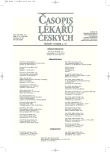-
Medical journals
- Career
Pregnancy and Delivery in Type II Hereditary Antithrombin Deficient Patients
Authors: Z. Hajšmanová
Authors‘ workplace: Hematologický úsek ÚKBH FN a LF UK, Plzeň
Published in: Čas. Lék. čes. 2008; 147: 535-537
Category: Case Report
Overview
Antithrombin is a plasma protein that regulates haemostasis by inhibiting procoagulant serine proteases. Hereditary antithrombin deficiency is associated with an increased risk of venous thromboembolism. The risk of vessel occlusion escalates especially during the pregnancy due to hyperestrogen condition both in the maternal and in foetal circulation. Our case report describes a 24-years old gipsy-woman with severe congenital AT deficiency and recurrent foetal loss in her history. She informed us about her 4th pregnancy in the 12th gestation week therefore warfarin treatment and regular checking up INR was recommended. We didn’t have any information about the pregnancy course till the 41st gestation week. When the patient came to give birth, the entry INR value was 1.0. She has delivered a healthy male newborn by caesarean section. Two weeks after delivery when effective INR value due to peroral anticoagulant therapy was achieved, she was released from the hospital and since that we have not seen her.
Key words:
antithrombin, hereditary deficiency, pregnancy and delivery.
Sources
1. Picard, V. et al.: Molecular Bases of Antithrombin Deficiency. Twenty Two Novel Mutations in the Antithrombin Gene, Human Mutation,: Mutation in Brief #896 (2006) Online.
2. Picard, V. et al.: Antithrombin Phe 229 Leu: a new homozygous variant leasing to spontaneous antithrombin polymerization in vivo associated with severe childhood thrombosis. Blood, 2003, 102, s. 919–925.
3. Dahlbäck, B.: Advances in understanding pathogenetic mechanisms in thrombophiliac disorders. Blood, 2008, 112, s. 19–27.
4. Lane, D. A., Olds, R. R, Thein, S. L: Antithrombin and its deficienty states. Blood Coagul. Fibrin., 1992, 3, s. 315–341.
5. Kvasnička, J.: Trombofilie a trombotické stavy v klinické praxi. Praha, Grada, 2003.
6. Hrachovinová I.: Molekulární podstata vrozeného defektu antitrombinu u deseti českých rodin. Čas. Lék. čes., 2000, 139, s. 595–597.
7. Dulíček, P., Penka, M., Binder, T., Unzeitig, V.: Návrh antitrombotické profylaxe a péče o trombofilní stavy v gynekologii a porodnictví. www.thrombosis.cz
Labels
Addictology Allergology and clinical immunology Angiology Audiology Clinical biochemistry Dermatology & STDs Paediatric gastroenterology Paediatric surgery Paediatric cardiology Paediatric neurology Paediatric ENT Paediatric psychiatry Paediatric rheumatology Diabetology Pharmacy Vascular surgery Pain management Dental Hygienist
Article was published inJournal of Czech Physicians

-
All articles in this issue
- Rare Diagnosis of CD4⁺56⁺ Leukemia from Dendritic Cells Type DC2
- Feedings of Critical Care Patients by Endoscopic Three-luminal Tube – A Retrospective Analysis
- Duodenal Atresia and Stenosis
- Suicidal Attempts within the Set of Young Adult Parents of Children Observed in ELSPAC Study
- Pregnancy and Delivery in Type II Hereditary Antithrombin Deficient Patients
- Treatment of Hemosuccus Pancreaticus by Bilateral Embolization of Gastric Arteries
- Journal of Czech Physicians
- Journal archive
- Current issue
- Online only
- About the journal
Most read in this issue- Duodenal Atresia and Stenosis
- Pregnancy and Delivery in Type II Hereditary Antithrombin Deficient Patients
- Feedings of Critical Care Patients by Endoscopic Three-luminal Tube – A Retrospective Analysis
- Rare Diagnosis of CD4⁺56⁺ Leukemia from Dendritic Cells Type DC2
Login#ADS_BOTTOM_SCRIPTS#Forgotten passwordEnter the email address that you registered with. We will send you instructions on how to set a new password.
- Career

